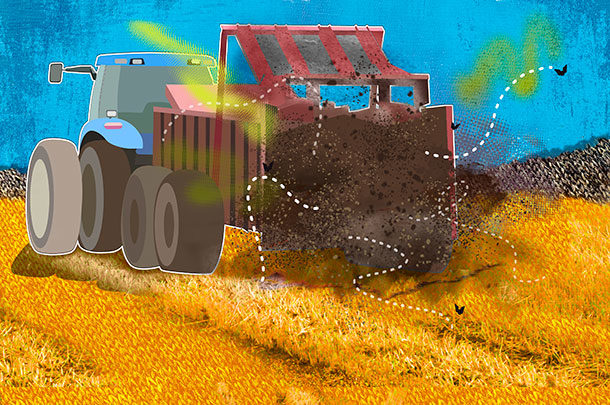While it’s tempting to think, “Hey, I was here first, and if the neighbors don’t like it, they can just move – dang city people,” you might want to check that attitude. They (the city people moving to the country) outnumber you, for one thing, and for another, they like to write letters to editors and attend planning and zoning meetings. Sure, your state has “right to farm” laws, but if you’re stinking up the issue, just count up how many legislative folks are also city folks. How long do you think you’ll win that battle?
While I’m on your side, let’s just suspend emotion for the moment and talk about the issue of manure application on fields. You can avoid those irate phone calls from neighbors by keeping just a few things in mind:
Wind direction
Yes, odor travels with the wind (and moves laterally very little) – you already know that. Identify which way the wind is blowing to identify the neighbors who will be impacted the most. If the wind is blowing, could you spread manure on a different field that might have less impact? And pay attention to the wind directional forecast for the next 36-hour period after applying manure. As we all know, it takes at least a day and a half for that odor to dissipate under good conditions.
Using a weather forecast service that includes wind direction, wind speed, sky conditions and temperature can help in the decision-making process (see Air Sports Net as an example).
Time of day
We’ve seen a lot of smoky skies in the Pacific Northwest (which isn’t all that unusual in late summer), which caused several high school football game cancellations. The issue was created because in later evening (when football games are held) or early morning, the smoke tends to hug the ground. About midday, the smoke disperses a bit as the warming air starts to rise and mix the smoke with fresh air above. As the air cools, however, it tends to hug the ground again (cold doesn’t rise).
Odor follows the same principle. Spreading manure during bright sunshine and warming hours is best for diluting odors.
Bury that stuff
When possible, the best practice for controlling odor involves incorporating the manure into the soil through some form of tillage. Soil acts as a filter to remove odors. It’s a tradeoff, however, in that oftentimes we want a cover left on the soil so it’s not exposed and subject to erosion, so tillage isn’t always possible.
Drying conditions
If the manure you spread stays on the surface, then the next 36 hours is crucial. If the weather is such that the manure can dry quickly, that will significantly reduce the odor. If the humidity, lack of sunshine and wind, and other weather factors combine to make poor drying conditions, then the odors will linger longer.
What the U.S. population knows about agriculture is greatly diminishing, if not already gone. What folks can see (and smell) about agriculture comes from their observations of your fields as they drive by. Let’s give them something to cheer for, rather than something to write letters to the editor about. ![]()

-
Lynn Jaynes
- Managing Editor
- Progressive Forage
- Email Lynn Jaynes
PHOTO: Illustration by Corey Lewis.










